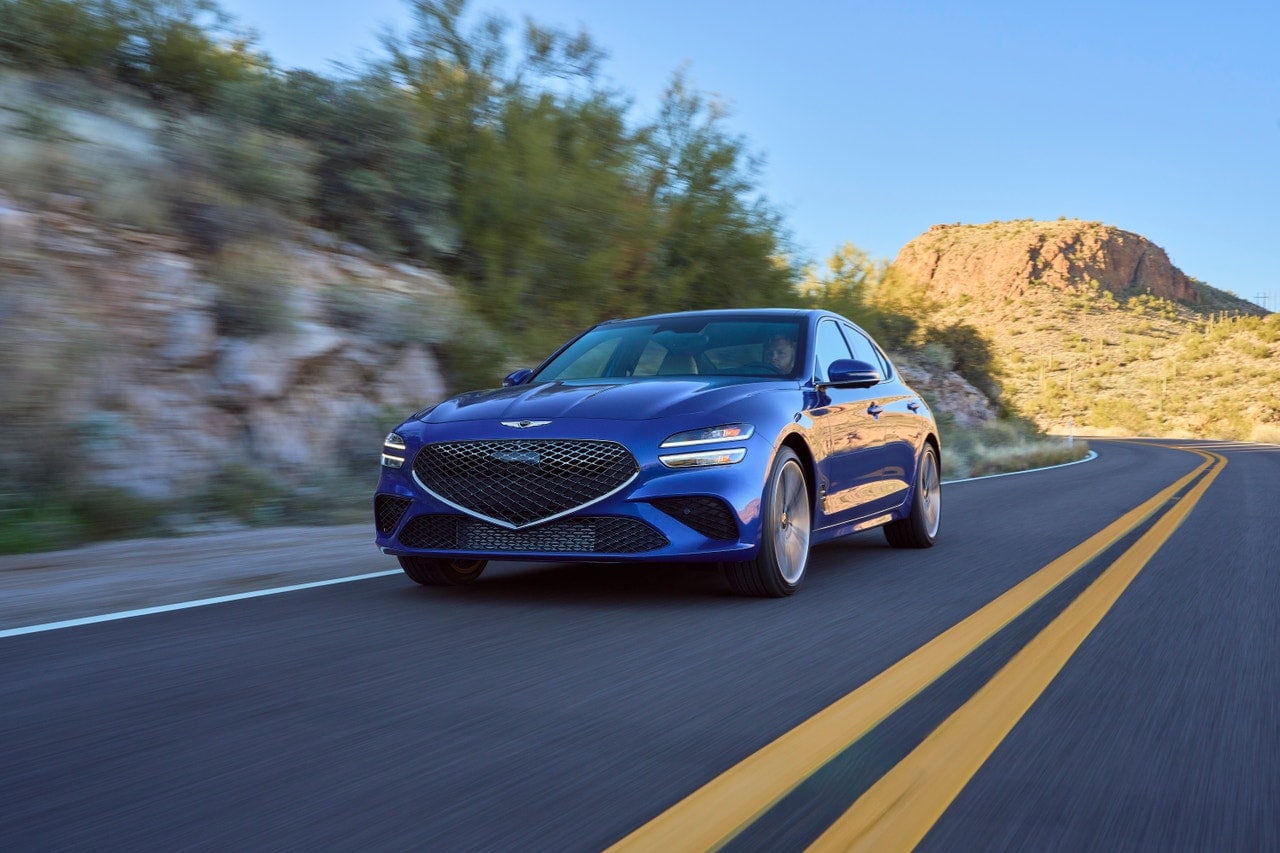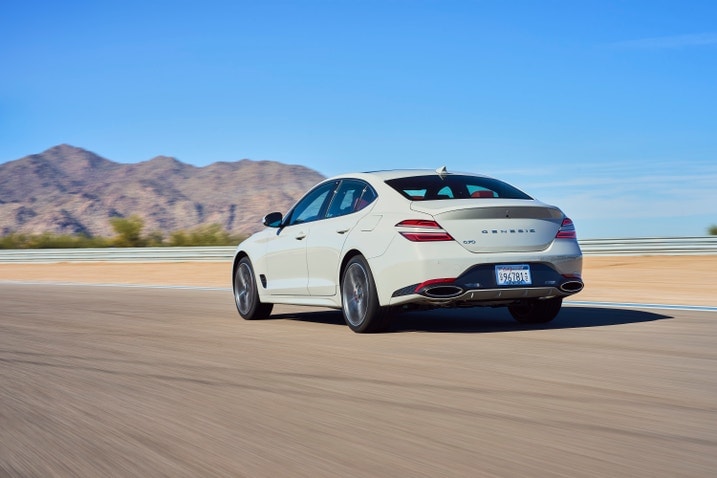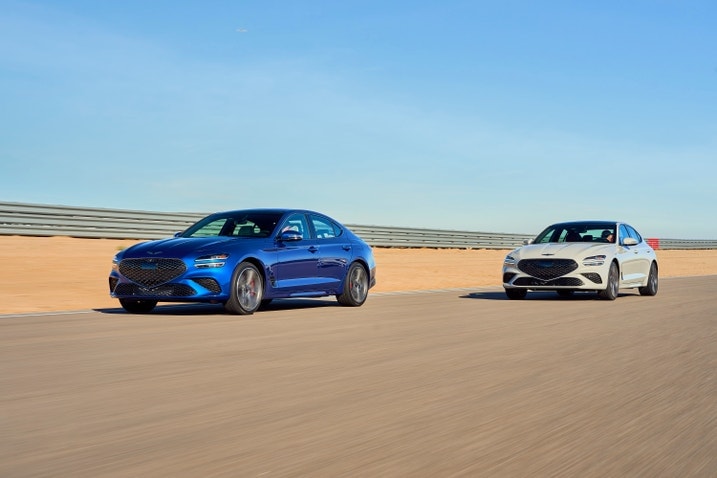- 2024 Genesis G70 receives a new turbocharged four-cylinder engine making 300 hp.
- Brembo performance brakes are now standard.
- It features a new touch-sensitive interface for the climate control.
2024 Genesis G70 First Drive Review: A Bigger Engine Makes for a Better Car
But with more power comes worse fuel economy
The 2024 Genesis G70, which is the brand's smallest and most affordable luxury sedan, gets a handful of changes this year. Genesis introduced the G70 for 2019 and gave it a big update for 2022 that included fresh styling, a revised interior, an improved infotainment system and ehanced advanced driver aids. The 2024 updates are less comprehensive by comparison, though a more powerful base engine does breathe some new life into the car. How much does it move the needle against the Acura TLX, Lexus IS and stalwart small European luxury sedans? We had a chance to drive the 2024 G70 to find out.
What's under the G70's hood?
The G70's previous base engine was a turbocharged 2.0-liter four-cylinder that produced 252 horsepower. While that's a decent amount of power for a small luxury sedan, the 2024 model's new mill is substantially stronger. Now upsized to 2.5 liters, the engine — which comes in the renamed G70's 2.5T base trim level — cranks out 300 hp and 311 lb-ft of torque. That makes it one of the most powerful you'll find in the class, one-upping the base engines in the Audi A4, BMW 3 Series and Mercedes-Benz C-Class. The G70's optional engine, a turbocharged 3.3-liter V6 for the 3.3T trim, carries over unchanged with its 365 hp and 376 lb-ft of torque. No matter what engine you opt for, it's paired with an eight-speed automatic transmission that sends power to the rear wheels. All-wheel drive is available with both engines.
Decision time: four-cylinder or V6?
We were eager to try out the G70's new four-cylinder engine as it's going to be the one under the hood of most G70s. The engine's extra power makes the G70 feel pretty peppy, especially in each gear's low to mid-range. The extra power from the new engine is enough that we don't see much of a need to upgrade to the 3.3T's turbo V6. Equipped with the larger engine, the G70 doesn't feel vastly quicker in around-town driving. We also wish the V6 sounded a little sweeter, as there's hissy induction noise never really goes away.
The eight-speed automatic is the only major complaint when it comes to the 2.5T's powertrain. It shifts smoothly but occasionally feels lazy to respond when you want it to downshift. It's a bit annoying on the highway when you want to pass a slower car and downright frustrating when you're driving on a track. The paddle shifters feel unresponsive and disconnected from the transmission, sapping some of the joy from the driving experience.
How does the G70 handle?
The steering in the 2.5T is light but offers a decent feel for the road, so it's not difficult to place the nose of the car right where you want it. The light steering also makes it easy to park or maneuver in a tight lot. The V6 is physically larger and heavier than the four-cylinder, and you feel that little bit of extra weight on the front end that results in the 3.3T not turning in quite as sharply.
For 2024, all G70s come standard with Brembo brakes. It's unusual for an automaker to fit performance brakes to an entire model lineup, so kudos to Genesis. The front brakes have 13.8-inch front rotors with four-piston fixed calipers while the rears make do with 13.4-inch rotors and two-piston fixed calipers. They're strong but easy to modulate, so it's easy to come to a smooth stop in traffic. Additionally, the Sport Prestige model includes a mechanical limited-slip differential and electronically controlled adaptive suspension.
Genesis offered some time on the track with the rear-wheel-drive G70 3.3T Sport Prestige, the most athletic G70 in the lineup. You can feel the suspension sharpen up when you adjust to a sportier drive mode, reducing body roll and helping the G70 feel smooth in a corner. There's mild understeer at the limit, but it's easy to reduce the throttle and tuck the nose back in. Rear-wheel-drive models come with Michelin Pilot Sport 4S summer performance tires (all-wheel-drive G70s come with all-season tires), so grip in a corner is rarely an issue unless you're overly aggressive with the gas pedal. Even then, it's predictable.
How comfortable is the G70?
The G70 rides well on the street, providing a good balance between a comfortable ride quality and sporty feel. All G70s ride on 19-inch wheels. That's notable because Genesis' engineers were able to tune the G70's ride quality specifically for 19s and didn't have to account for various optional wheel sizes. The G70 absorbs bumps without shocking the cabin, though it never seemed to be able to fully smooth out cracked pavement in our limited testing.
The front seats are comfortable and supportive. Adjustable bolsters help keep you snug and in place without feeling too confining. Unfortunately, the G70 isn't as quiet as we expect a luxury car to be, with more road and wind noise coming through than what we want. That's a bit of a surprise given how quiet and refined some of Genesis' other vehicles are.
How's the G70's interior?
The G70's interior remains mostly unchanged. The most notable update for 2024 is a revised climate control system. The buttons and some knobs have been replaced with a touchscreen, and as is typical when an automaker ditches physical controls for a screen, it's not quite as nice to use as the old system. You can still adjust the temperature with a knob, but the controls for things like fan speed and heated seats require taking your eyes off the road to adjust.
The G70's interior as a whole continues to be a mixed bag. We like the driving position, as everything is easy to see and reach. There are many adjustments available for the seat and steering wheel, so it shouldn't be hard to quickly find a comfortable position. But the interior remains tight and limited in space compared to rivals, especially for rear seat passengers. The G70's small size makes it nimble, but it also makes it less spacious, too.
How's the G70's tech?
The G70's infotainment system carries over from last year, too. It's easy to use but it lacks the level of customization found in some newer rivals. The screen is responsive, and both Apple CarPlay and Android Auto are standard. For 2024, the G70 adds USB-C charging.
Standard driver aids include adaptive cruise control, blind-spot monitoring and lane-keeping assist. It's all straightforward to use. The adaptive cruise had no problem keeping a good gap on the highway, and we didn't notice any false errors with any of the other systems.
How economical is the G70?
The 2024 G70 2.5T has an EPA-estimated fuel economy of 24 mpg combined (21 city, 29 highway). That drops to 21 mpg combined (18 city, 27 highway) if you opt for the bigger 3.3T engine. Those are all rear-wheel drive estimates; you can subtract 1 mpg from each of those figures for all-wheel drive.
While we appreciate the new four-cylinder's power, its fuel economy ratings are worse than the old engine's and are well below those of class rivals, some of which get close to 30 mpg in combined driving. Fuel economy ratings for the V6 haven't changed, but they compare just as unfavorably to rivals. Disappointing stuff from otherwise solid powertrains.
Edmunds says
A new engine makes the Genesis G70 more compelling and better to drive than ever before. Other changes for 2024 are a lot less notable and haven't done enough to move the needle in the G70's favor. It's still affordable and nice to drive, but the G70 still can't quite match the class leaders overall.










 by
by